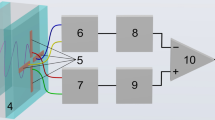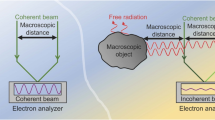Abstract
RECENT researches have shown that gases are rendered conductors of electricity when negatively-charged ions move through them with a high velocity. Thus the kathode rays and the Lenard rays possess the property of ionising gases through which they pass (J. J. Thomson, “The Discharge of Electricity through Gases”). Becquerel (Comptes rendus, March 26, 1900) also has recently shown that the conductivity produced by radium is due to small negatively-charged particles given off by the radio-active substance. In these cases the charged particles which ionise the gas move with velocities nearly equal to the velocity of light.
This is a preview of subscription content, access via your institution
Access options
Subscribe to this journal
Receive 51 print issues and online access
$199.00 per year
only $3.90 per issue
Buy this article
- Purchase on Springer Link
- Instant access to full article PDF
Prices may be subject to local taxes which are calculated during checkout
Similar content being viewed by others
Author information
Authors and Affiliations
Rights and permissions
About this article
Cite this article
TOWNSEND, J. The Conductivity produced in Gases by the Motion of Negatively-charged Ions. Nature 62, 340–341 (1900). https://doi.org/10.1038/062340b0
Issue Date:
DOI: https://doi.org/10.1038/062340b0
This article is cited by
-
Similarity theory and scaling laws for low-temperature plasma discharges: a comprehensive review
Reviews of Modern Plasma Physics (2023)
-
Advances in nuclear detection and readout techniques
Nuclear Science and Techniques (2023)
-
Standardized measurement of dielectric materials’ intrinsic triboelectric charge density through the suppression of air breakdown
Nature Communications (2022)
-
Analysis of light emission and Schlieren from short gap high voltage streamers representing lightning impulses
Scientific Reports (2021)
-
Einstein Relation for Electrons in an Electric Field
Journal of Statistical Physics (2016)
Comments
By submitting a comment you agree to abide by our Terms and Community Guidelines. If you find something abusive or that does not comply with our terms or guidelines please flag it as inappropriate.



